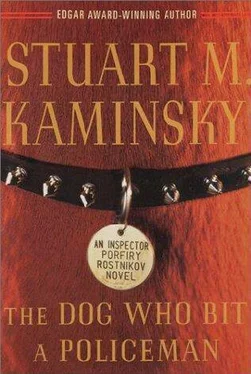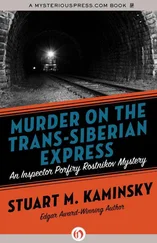Stuart Kaminsky - The Dog Who Bit a Policeman
Здесь есть возможность читать онлайн «Stuart Kaminsky - The Dog Who Bit a Policeman» весь текст электронной книги совершенно бесплатно (целиком полную версию без сокращений). В некоторых случаях можно слушать аудио, скачать через торрент в формате fb2 и присутствует краткое содержание. Жанр: Полицейский детектив, на русском языке. Описание произведения, (предисловие) а так же отзывы посетителей доступны на портале библиотеки ЛибКат.
- Название:The Dog Who Bit a Policeman
- Автор:
- Жанр:
- Год:неизвестен
- ISBN:нет данных
- Рейтинг книги:3 / 5. Голосов: 1
-
Избранное:Добавить в избранное
- Отзывы:
-
Ваша оценка:
- 60
- 1
- 2
- 3
- 4
- 5
The Dog Who Bit a Policeman: краткое содержание, описание и аннотация
Предлагаем к чтению аннотацию, описание, краткое содержание или предисловие (зависит от того, что написал сам автор книги «The Dog Who Bit a Policeman»). Если вы не нашли необходимую информацию о книге — напишите в комментариях, мы постараемся отыскать её.
The Dog Who Bit a Policeman — читать онлайн бесплатно полную книгу (весь текст) целиком
Ниже представлен текст книги, разбитый по страницам. Система сохранения места последней прочитанной страницы, позволяет с удобством читать онлайн бесплатно книгу «The Dog Who Bit a Policeman», без необходимости каждый раз заново искать на чём Вы остановились. Поставьте закладку, и сможете в любой момент перейти на страницу, на которой закончили чтение.
Интервал:
Закладка:
Cleaning up the blood took almost half an hour and left the thin carpet wet.
“We can do no better,” Yulia had announced, surveying the room. “I’ll rearrange the furniture later to cover the spot. It will look fine. Now we get rid of the bag and the body.”
“How?”
“I’ll take the bag,” she said. “I’ll carry it to the park and drop it in the trash there.”
“Burn it,” Yevgeny suddenly said in a monotone, without looking at the others. “No one must find those photographs, those tapes.”
“All right, I will burn the bag,” she said.
“I want to watch,” said Yevgeny.
“You don’t trust me,” Yulia said with a smile.
“No.”
Yulia gave a raspy, deep laugh which sent an icicle down Oleg’s back. “Then you shall watch,” she said.
“The originals,” said Yevgeny, slowly coming to life and rubbing his eyes.
Yulia shook her head. “I will protect you, Yevi. I will burn these photographs and tapes. I will help get rid of the body. The three of us, if the police get close, and they are looking for you, must never vary from the story that Jurgen was attacking me, that he had a gun, that you bravely overcame him and had to kill him to protect yourself. As for the body, you panicked and to protect me again wrapped him up, and we, you and I, took him to the place I have in mind. Your friend Oleg need not be involved.”
Yevgeny nodded in agreement.
“I have the originals of the photos and the tapes safely hidden,”
she said. “And so they will stay. I ask you for nothing in exchange.
They are my insurance that the two of you will not betray me. I like you, Yevi. You have never hurt me. You have been generous and undemanding. And now you’ve rid me of my beast. No, that is a cliche. You’ve rid me of something that looked like a human, something with an insatiable lust, who enjoyed the anguish of others.
He is the only person I have ever known who simply enjoyed being evil. One time I asked him if he was the devil. He said he was.”
Yevgeny finally stirred and stood. “Let us do it,” he said.
The rest was a frightening nightmare for Oleg, who was grateful that Yulia was clearly in charge and knew what she was doing and that Yevgeny was participating. She carried the bulging garbage bag through which shards of wood from the broken box now jut-ted like angry little spikes, while Oleg and Yevgeny carried the awkward and heavy dead German. Yulia also held a two-liter plastic bottle. Yulia had surveyed the hallway and, assured that no one was in sight, led the two men carrying the body to the service steps.
Oleg started to head down but Yulia said, “No. Up.”
Oleg was in no state to challenge anything she said, and Yevgeny had lapsed back into a near-somnambulistic state.
They struggled up two flights, where Yulia opened the door to the roof and put down bottle and bag to open the door with a key.
“Jurgen had the key made,” she explained. “I was never sure why.
Now I have a reason.”
They struggled onto the roof. Yulia led the way to a ribbed metal shed whose door was open.
There wasn’t much inside the shed: a few paint cans, a pile of rags, something that looked like a radio with its electrical intestines showing. The shed was dark, and no light came from the moon and stars covered by clouds. But there was enough, just enough, light coming from Kalinin Street below so that Oleg saw where Yulia pointed. He guided Yevgeny and the body to the spot she had indicated and they put their burden down.
“Back,” said Yulia, pouring the contents of the bottle she had been carrying over the body and the garbage bag she had placed atop it.
Oleg led Yevgeny several steps away from the shed. There was a sudden flare of flames as Yulia joined them.
“Someone will see,” Oleg said. “Someone will report a fire on the roof. The police. .”
Yulia stepped to Yevgeny’s right and took his arm.
“No one will see. No one will report. No one will discover perhaps for days, and no one will be able to identify the corpse. The evidence will be gone. It will remain a mystery. I have seen such things happen. Yevi can stay with me tonight. Tomorrow. . I don’t know.”
“It looks like rain,” Oleg said as the sky rumbled above them.
“It has for days,” she said, “but the shed will keep it from our work. Even a deluge won’t stop that fire.”
They stood watching for a few minutes, just to be sure the body and the bag were on fire and not likely to go out.
“Go home, Oleg,” Yulia said.
Oleg was hypnotized by the flames, the smell of tape and flesh.
He stood transfixed.
“Go home, Oleg Kisolev,” she said firmly.
And, finally, he did.
Oleg had made his way home and now lay in his bed next to Dmitri, trying to convince himself first that the whole thing had not happened. He failed. Then he tried to convince himself that he was safe, that the body of the German would burn beyond recognition, that the green garbage bag and its contents would also be burned without leaving a trace, aside from ashes.
Oleg put the Olympic history book down and reached over to turn off the light. His hand hesitated and he realized that he did not want to be in darkness. He adjusted his pillow and slid down under the covers, turning to put his arms around Dmitri, who made a slight sound of childish pleasure.
Maybe, thought Oleg, maybe I can sleep like this. Maybe.
Sarah Rostnikov’s cousin, Leon Moiseyevitch, the doctor, sat at the piano beside the cellist and oboe player with whom he had performed for almost five years. They specialized in standard works, Bach and Mozart particularly, and Leon found that he could lose himself in the music, that rehearsal after rehearsal, concert after concert, brought him closer to the magical state in which he could simply let his fingers and body perform while he listened.
It was late, but the small hall which held seventy-five was full and the trio had played for more than two hours.
Some nights Leon played with a jazz group at a nightclub called Hot Apples, a short walk from the Kremlin walls.
It had been a nightmare of a day in his office, a nightmare from which he tried to distance himself emotionally, and from which he knew he could partially cleanse himself through music. When he was finished, he would go home, kiss his sleeping son, and go to his bedroom.
Leon was financially comfortable. His reputation was secure among both the newly rich and the old powerful Communists who had managed to make the transition to new power by renouncing the crumbled party and embracing the sham of democracy. Leon was secure.
To help cleanse his conscience, he put in a dozen hours a week at the public hospital, treating whoever came into the emergency room and charging nothing.
The past week had been typical. He had treated one woman who had been struck by a piece of falling concrete from a crumbling building. The woman had died from massive head wounds, as Leon had known she would when she was brought in. It was amazing that she had stayed alive long enough to be brought to the emergency room. About one hundred Muscovites died each year after being struck by falling bricks and concrete. Another dozen died annually after being crushed by huge icicles as they walked down the street. Leon had treated people who had stepped into holes in the sidewalk and suffered broken limbs, people who had drunk contaminated tap water, people who had received deadly shocks of electricity while riding trolley buses, people who had been poisoned by bootlegged vodka, people who had been struck by automobiles driven by motorists who routinely ignored the yellow painted lanes and drove madly, ignoring pedestrians.
Then there were the more bizarre cases he had seen over the past year: the two little boys aged six and five, who had found a hand grenade in Gorky Park and had died of injuries when it exploded while they were playing with it; and the bespectacled young businessman on the way home from work who spotted an odd white Styrofoam box on the ground next to a metal-mesh garbage container. The man had picked up the box to deposit it in the trash, and lifted the lid. The contents of the box were two soft, green claylike masses, the size of small melons. The suspicious and con-scientious young businessman, who had a wife and a three-year-old daughter, had brought the Styrofoam box and its contents to the hospital emergency room where Leon was on duty. Leon had told the young man to place the container on a small stainless steel table with rubber-covered wheels. The container proved to be emitting a high level of radiation. The man had been exposed to the radiation when he opened the box to examine its contents and when he carried it the half mile to the hospital. The man was still being treated half a year later and not doing particularly well. And the police still did not have the slightest idea who might have placed the white Styrofoam box near the trash container.
Читать дальшеИнтервал:
Закладка:
Похожие книги на «The Dog Who Bit a Policeman»
Представляем Вашему вниманию похожие книги на «The Dog Who Bit a Policeman» списком для выбора. Мы отобрали схожую по названию и смыслу литературу в надежде предоставить читателям больше вариантов отыскать новые, интересные, ещё непрочитанные произведения.
Обсуждение, отзывы о книге «The Dog Who Bit a Policeman» и просто собственные мнения читателей. Оставьте ваши комментарии, напишите, что Вы думаете о произведении, его смысле или главных героях. Укажите что конкретно понравилось, а что нет, и почему Вы так считаете.












